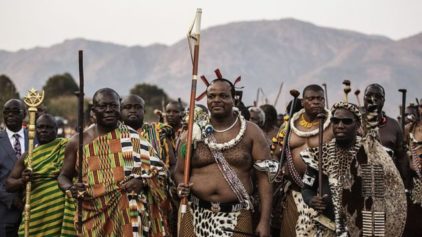The teachers’ strike in Swaziland took a break this week to consider its options as the government continues to play hardball. Unionists say it has prepared them for pro-democracy demonstrations in September. But to effect change they’ll need to sustain the pressure and convince South Africa to act.
The teacher and public services strike started when unions called for a 4.5% cost of living adjustment. The Swaziland National Association of Teachers (Snat) stopped work over a month ago and were soon followed by the Swaziland Democratic Nurses Union (Swadnu), National Public and Allied Workers Union (Napsawu) and some affiliates of the banned umbrella federation, the Trade Union Congress of Swaziland (Tucoswa).
Vincent Dlamini, general secretary of Napsawu and head of Tucoswa, said nearly 50 teachers and 16 civil service workers were arrested during the month on unclear charges before the strike was temporarily suspended for three days on Monday. Earlier in the month, an interdict forced nurses back to work as they provide an essential service. The unions will meet on Wednesday to decide the best avenue forward.
The strike is taking its toll on teachers, as those arrested have been put on suspension and many more are being paid just a third of their salaries.
Reports said the Swazi government has made a resolution on the cost of living increase, but wouldn’t unveil the details while strike action continued. Mary Pais Da Silva, a coordinator for the Swaziland Democracy campaign, said 4.5% is miniscule given the circumstances. She pointed out that inflation of around 9%, and the new 14% VAT has reduced the spending power of workers’ wages.
Government spokesman Percy Simelane told AFP the country had to take the advice of its neighbours and the IMF to rein in spending. “Even if money could come now it would be very difficult to increase salaries”, he said. “We need to adhere to this advice or sink.”
Critics maintain there is enough money to pay the cost of living adjustment, pointing to Circular No. 1, the lucrative payouts to legislators once they leave office. Simelane said they were obviously causing discontent and would be reviewed.
But there are more insulting signs of King Mswati III and his government’s opulence that continue to draw derision. Mswati’s wives are currently on a shopping spree in Las Vegas, with the royal party staying in 10 villas at R20,000 each per night. And, said Da Silva, Simelane and the government await a new fleet of vehicles funded by taxpayers.
Unionists said the strike is ultimately about worker remuneration, but it has helped prepare them for Global Week of Action, “an unprecedented mobilisation” to further the democracy campaign. Wandile Dludu of the Swaziland United Democratic Front, a coalition of pro-democracy civil society organisations, said the strike “helps expose the challenges Swazis face but most importantly it helps explain the arrogant and undemocratic nature of his majesty.”
“For us it’s a giant leap forward in our struggle for a better Swaziland and for the world to see the government for what it is”, said Wandile.
Read more: All Africa
